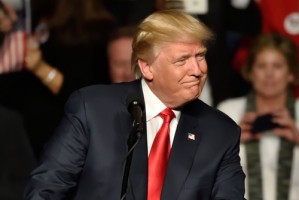Trump asserts 'complete power to pardon'; can he pardon himself?

President Donald Trump/Shutterstock.com
President Donald Trump asserted in one of several tweets Saturday that everyone agrees he has “the complete power to pardon.”
That tweet followed a Washington Post story reporting that Trump asked his advisers whether he has the power to pardon aides, family members and even himself, the newspaper reports. Trump is also exploring alleged potential conflicts by Robert Mueller, which could be an avenue to justify his removal as special counsel, according to the Post.
Trump’s lawyers, including John Dowd, told the Post that the story on exploring pardons is not true.
The stories and Trump’s tweets have spurred legal experts to explore the question: Can the president pardon himself?
Those who say the answer is no include Harvard law professor Laurence Tribe, University of Minnesota law professor Richard Painter, and former White House ethics lawyer Norman Eisen, who wrote an op-ed for the Washington Post. George Washington University law professor Jonathan Turley argues in an article for The Hill that the Constitution doesn’t explicitly bar self-pardons, although it should.
The Constitution bars the president from using his pardon power to prevent his impeachment, but doesn’t specifically say whether he can pardon himself in criminal cases. The ban on impeachment pardons is in Article II, which says the president has the power “to grant reprieves and pardons for offenses against the United States, except in cases of impeachment.”
Tribe, Painter and Eisen point to another provision in Article I that says impeached individuals “shall nevertheless be liable and subject to indictment, trial, judgment and punishment, according to law.”
Tribe, Painter and Eisen argue that the Article I provision would make no sense if the president could pardon himself. They also cite the “broad precept against self-dealing” in other constitutional provisions, such as the rule that congressional pay hikes can’t take effect during the Congress that enacted them.
Turley says a judicial decision on the issue could go either way. “However, the well-based opposition to self-pardons should not lead to self-delusion,” he says. “If President Trump were to pardon himself, he could legitimately claim to be acting within the express language of the Constitution.”
While all agree the U. S. President has the complete power to pardon, why think of that when only crime so far is LEAKS against us.FAKE NEWS
— Donald J. Trump (@realDonaldTrump) July 22, 2017



